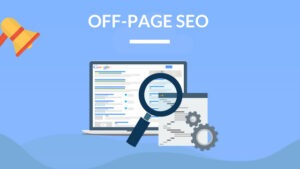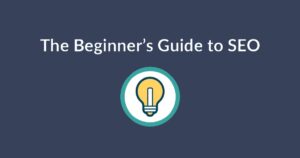In the highly competitive digital landscape, Search engine optimization (SEO) remains critical to a website’s success. SEO is broadly divided into two categories: On-page SEO and Off-page SEO.
While on-page SEO involves optimizing elements like meta tags, content, and website structure, off-page SEO revolves around efforts to improve your website’s visibility and reputation outside of your domain.
For a successful SEO strategy, mastering both is essential. This article provides an in-depth guide to off-page SEO, covering a comprehensive checklist and eight actionable tips to boost your rankings and improve your overall digital footprint.
What Is Off-Page SEO?
Off-page SEO refers to all activities you do outside of your own website to improve your ranking on search engine results pages (SERPs). These activities include building high-quality backlinks, increasing brand mentions, sharing content on social media, and optimizing for local SEO.
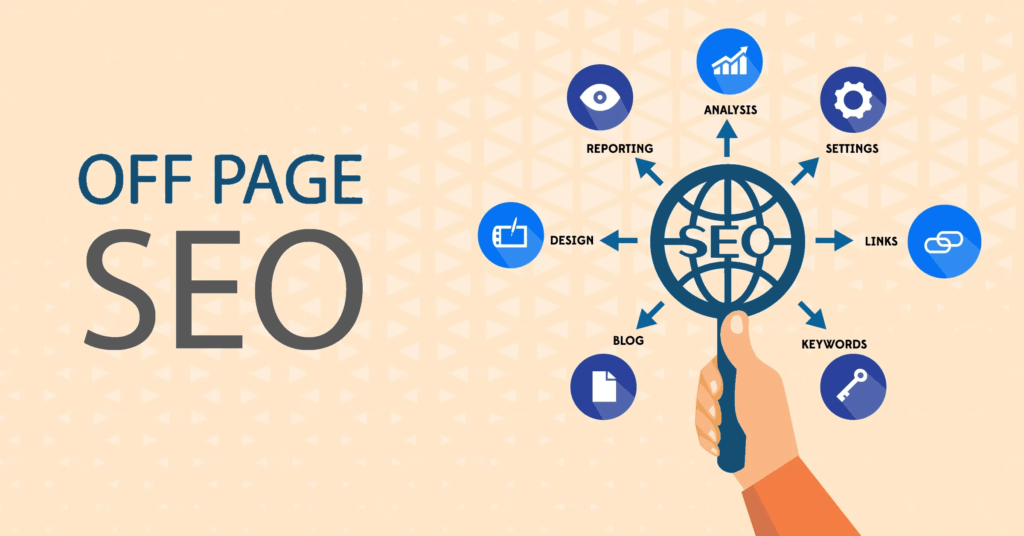
While on-page SEO ensures that your website is optimized internally, off-page SEO signals to search engines how the broader online community views your site.
Think of off-page SEO as a way to build your site’s credibility and authority. Search engines like Google take into account the relevance and quality of links pointing to your site and other indicators such as mentions and social signals.
Effective off-page SEO can drive more traffic, enhance your brand reputation, and improve your site’s ranking, making it a crucial part of any digital marketing strategy.
Off-Page SEO Checklist
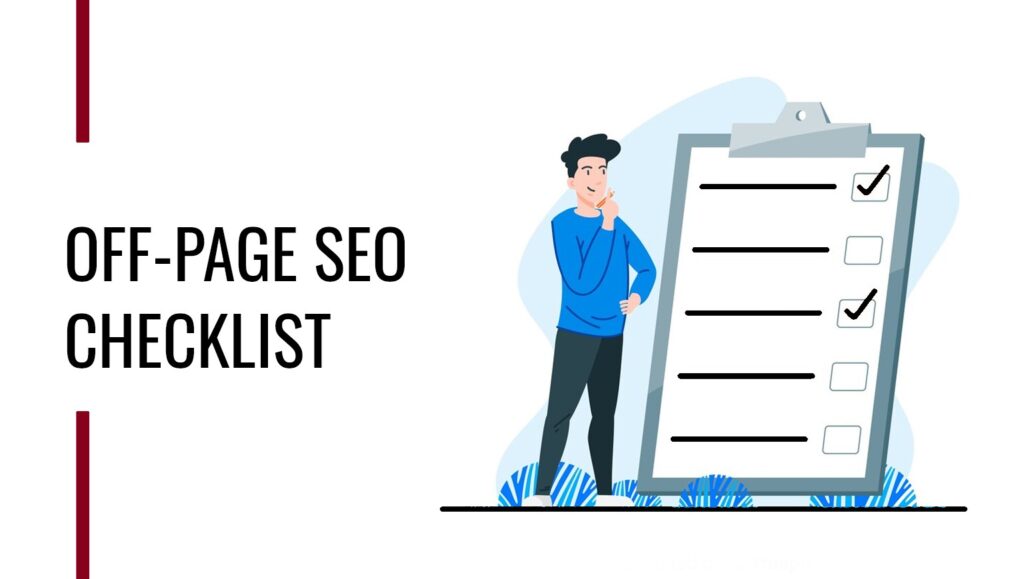
Now that we’ve established what off-page SEO is, let’s delve into the specifics. Below is a checklist of essential off-page SEO practices that will help you maximize your website’s visibility and authority:
- Audit Your Backlink Profile
- Analyze Your Competitors’ Link Profiles
- Build High-Quality Links
- Optimize for Local SEO
- Earn Brand Mentions
- Share Content on Social Media
- Collaborate with Influencers
- Be Active in Forums
We’ll explore each of these points in detail, helping you understand why they are important and how to implement them effectively.
1. Audit Your Backlinks
Your backlink profile is a key factor in how search engines evaluate your website’s authority and relevance. A backlink is essentially a vote of confidence from one site to another.
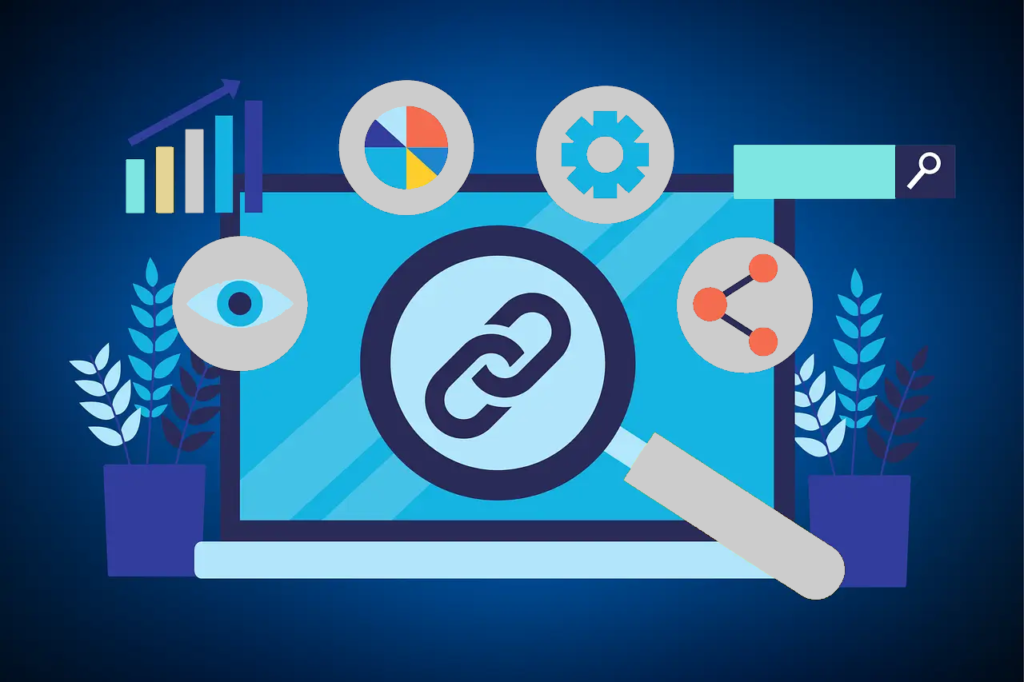
However, not all backlinks are created equal—quality trumps quantity. Having a large number of low-quality links can actually hurt your SEO efforts, which is why it’s essential to audit your backlink profile regularly.
Steps to Audit Your Backlink Profile:
- Use SEO tools:
To truly understand the full picture of your backlink profile, SEO tools are indispensable. Tools like Google Search Console can provide an extensive overview of the websites linking to you.
Google Search Console, for example, gives you insights into which domains are linking to your site, what pages are receiving the most links, and even which keywords are being linked most frequently.
It’s a comprehensive resource that helps you manage your site’s backlink profile from Google’s perspective. - Evaluate link quality:
When evaluating link quality for off-page SEO, focus on several key factors. First, consider Domain Authority (DA)—backlinks from high DA websites are more valuable and trusted by search engines than links from low-quality sites.
However, relevance is also important: links from websites related to your industry strengthen your credibility, while links from unrelated sites provide less SEO value.
Additionally, assess whether the linking site has genuine traffic—backlinks from high-traffic sites can increase referral traffic and improve overall SEO performance. - Identify toxic links:
Toxic links come from spammy, irrelevant, or low-authority websites and can harm your SEO, leading to potential Google penalties. These links often result from poor link-building practices like buying links or using link farms.
To protect your site, use tools like Google Search Console, to identify harmful links.
Once found, use Google’s Disavow Tool to tell Google to ignore these backlinks. Regularly monitoring and disavowing toxic links helps safeguard your site’s reputation and maintain a healthy SEO strategy. - Monitor anchor text:
Anchor text refers to the clickable words in a hyperlink and helps search engines understand the content of the linked page.
It’s important to have varied and relevant anchor text when other websites link to you, ideally including target keywords but avoiding over-optimization, which can lead to penalties.
A diverse anchor text profile should mix branded terms (like your company name), generic phrases (e.g., “click here”), and keyword-rich text. Regularly reviewing anchor text ensures it aligns with SEO goals and maintains a natural, healthy backlink profile.
Auditing your backlink profile ensures that you’re maintaining a healthy and authoritative link profile, which will strengthen your off-page SEO efforts.
2. Competitor Backlink Analysis
Once you have a clear understanding of your own backlink profile, it’s time to analyze your competitors’ link profiles. This can provide valuable insights into where their backlinks are coming from and which opportunities you might be missing out on.
How to Analyze Competitors’ Link Profiles:
- Identify Key Competitors:
The first step in analyzing competitors’ link profiles is to identify websites that outrank yours in search engine results for relevant keywords. These competitors attract more organic traffic, making it essential to understand their strategies.
Begin by listing competitors that consistently rank higher for your target keywords, including those outside of your direct business category but within the same niche.
This broader analysis can provide valuable insights into effective SEO tactics and patterns that you can adapt for your own site. - Use SEO tools for analysis:
Tools like Ahrefs allow you to analyze competitors’ backlink profiles. Look for high-quality, relevant links that you can target. - Check content strategies:
Analyze the content that earned them backlinks. Are they writing guest posts, creating infographics, or collaborating with influencers? This can guide your own link-building strategy. - Leverage broken link opportunities:
Find broken links on competitor sites and offer your own site’s content as a replacement.
By analyzing your competitors’ link profiles, you can uncover new link-building opportunities and develop strategies that give you a competitive edge.
3. Build High-Quality Links
Link building remains the backbone of off-page SEO. However, in today’s SEO environment, simply obtaining a large number of links is not enough. You need to focus on acquiring high-quality links from authoritative, relevant sites in your niche.
Best Practices for Building High-Quality Links:
- Guest posting:
Offer to write guest posts for well-established blogs or industry sites. Make sure your content is valuable and relevant to their audience. In return, you’ll usually get a link back to your site. - Create linkable content:
Focus on creating high-quality, shareable content, such as in-depth guides, infographics, or case studies that other websites want to link to. - Resource page link building:
Identify resource pages in your niche and request that they include a link to your content. - Outreach campaigns:
Conduct personalized email outreach to websites, asking them to link to your valuable content or offering to collaborate on content projects.
Building high-quality links requires effort and patience, but it pays off in the long run by improving your site’s authority and boosting your rankings.
4. Optimize for Local SEO
For businesses that operate in a specific geographic area, optimizing for local SEO is an essential aspect of off-page SEO. Local SEO helps you attract customers from your local area who are searching for your products or services.
Steps to Optimize for Local SEO:
- Claim and optimize your Google Business Profile:
A well-optimized Google Business Profile can significantly improve your visibility in local search results. Make sure all information is accurate and complete, including your business name, address, phone number, and hours of operation. - Build local citations:
Ensure that your business is listed in relevant local directories, such as Yelp, Yellow Pages, and industry-specific directories. Consistency in your business’s NAP (Name, Address, Phone number) information is crucial. - Encourage reviews:
Positive online reviews not only help build trust but also improve your local SEO rankings. Encourage satisfied customers to leave reviews on Google, Yelp, and other review platforms. - Local link building:
Connect with local blogs, news outlets, and influencers to gain backlinks from local sources. This can help establish your business as a local authority.
Local SEO ensures that your business appears in searches for customers in your area, driving foot traffic and local online sales.
5. Earn Brand Mentions
Brand mentions refer to instances where your brand is referenced online, even without a backlink. These mentions can occur on blogs, social media, news articles, or forums.
While brand mentions without links don’t carry as much weight as backlinks, they are still a valuable off-page SEO factor.
How to Earn Brand Mentions:
- Monitor brand mentions:
Use tools like Google Alerts to track mentions of your brand across the web. This will help you identify opportunities to request backlinks for unlinked mentions. - Create buzz-worthy content:
Publish press releases, case studies, or participate in industry events that generate attention for your brand. - Leverage social media:
Regularly engage with your audience on social media to increase the chances of being mentioned by other users or businesses. - Partner with bloggers or influencers:
Collaborate with influencers or bloggers in your niche to create content that mentions your brand.
Although not as potent as backlinks, brand mentions still signal to search engines that your brand is being talked about, adding to your online authority.
6. Share Content on Social Media
Social media is an effective off-page SEO tool that can help you amplify your content and increase its visibility. While social signals like shares and likes don’t have a direct impact on rankings, they can lead to more traffic and backlinks, indirectly boosting your SEO.
How to Use Social Media for Off-Page SEO:
- Choose the right platforms:
Focus on social media platforms where your audience is most active, whether it’s Facebook, Instagram, LinkedIn, Twitter, or others. - Create engaging content:
Share a variety of content types such as blog posts, infographics, videos, and interactive content to keep your audience engaged. - Engage with followers:
Actively respond to comments and engage with your followers. Building a loyal community can result in more shares and brand mentions. - Promote your content:
Use social media advertising to promote high-value content to a broader audience. This can increase your chances of earning backlinks.
Social media is not just about driving traffic but also about building relationships, increasing visibility, and encouraging shares and brand mentions, all of which are vital for off-page SEO success.
7. Collaborate with Influencers
Influencer marketing has become a powerful off-page SEO tactic. By collaborating with industry influencers, you can extend your reach, build your brand’s credibility, and acquire valuable backlinks or brand mentions.
How to Collaborate with Influencers for SEO:
- Identify relevant influencers:
Find influencers who have an audience that aligns with your target market. Tools like BuzzSumo can help you identify potential influencers. - Create win-win partnerships:
Offer something valuable to the influencer, such as free products, exclusive access, or monetary compensation in exchange for a mention, review, or collaboration. - Guest posting with influencers:
Some influencers run their own blogs, and guest posting on these sites can earn you a high-quality backlink. - Leverage social media takeovers:
Consider collaborating with influencers for social media takeovers, where they manage your brand’s social media accounts for a day or a specific event. This can drive significant engagement and increase visibility.
Influencer collaborations can improve both your online visibility and off-page SEO efforts by helping you reach a larger audience while securing high-quality backlinks.
8. Be Active in Forums
Online forums are communities where people ask questions, share advice, and discuss topics related to specific industries or interests. Participating in these forums can improve your brand’s visibility, provide opportunities for link-building, and help establish your authority.

How to Use Forums for Off-Page SEO:
- Join relevant forums:
Focus on forums related to your industry or niche. Platforms like Reddit, Quora, and industry-specific forums are excellent places to engage. - Provide value:
Engage with the community by answering questions and providing valuable insights. Avoid spammy self-promotion; instead, let your expertise do the talking. - Include links wisely:
Some forums allow you to include backlinks in your posts or signature, but use them sparingly and ensure they add value to the conversation. - Build relationships:
By consistently providing helpful content and engaging with forum users, you can build relationships that may lead to organic mentions or backlinks.
Active participation in forums can help increase brand recognition, establish authority in your field, and even lead to link-building opportunities over time.
Tracking Off-Page SEO Success
Tracking the success of your off-page SEO efforts is essential to ensure that your strategies are working and to make necessary adjustments. Some key metrics to monitor include:
- Backlink quality and quantity:
Regularly monitor the number of backlinks you have and their quality using tools like Ahrefs. - Domain authority:
Keep track of your website’s domain authority. As you acquire more high-quality backlinks, your DA should increase. - Referral traffic:
Use Google Analytics to track the amount of traffic coming from external sites. This can give you a clear picture of how well your link-building efforts are performing. - Social signals:
Monitor the engagement your content receives on social media, such as shares, likes, and comments. These social signals can indirectly impact your SEO. - Local rankings:
If you’re focusing on local SEO, keep track of how your website ranks for local searches using tools like BrightLocal.
Tracking these metrics will help you gauge the effectiveness of your off-page SEO efforts and make necessary adjustments to improve your overall strategy.
Improve Your Off-Page SEO Today
Off-page SEO plays a critical role in improving your website’s visibility, authority, and overall search engine ranking. While it requires consistent effort and time, the benefits are well worth the investment.
By following the off-page SEO checklist outlined in this article, you can build a strong, reputable, and high-ranking website.
Remember, the key to off-page SEO success is a combination of high-quality backlinks, social engagement, influencer collaborations, and community participation. Start implementing these strategies today, and watch your rankings climb to new heights!












